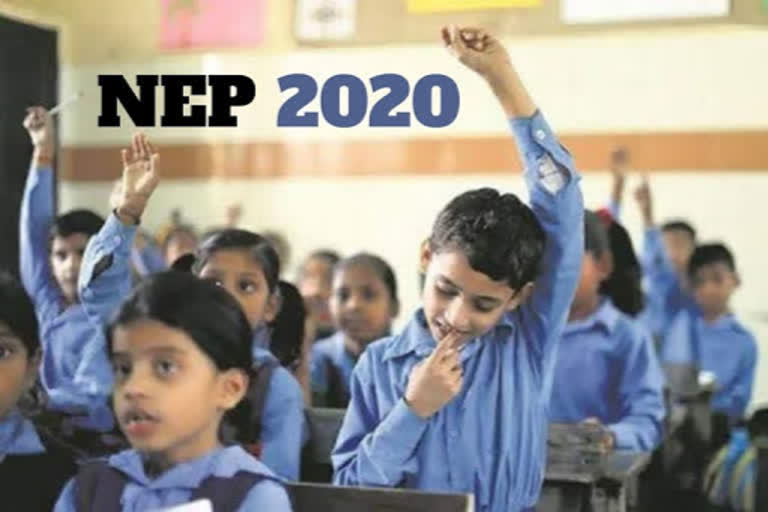New Delhi: With the government claiming that the National Education Policy (NEP) 2020 will revamp the education structure, former NCERT director Krishna Kumar said that mere transformational agendas will not be effective, as the reforms will have to be sustained over time.
In an interview with Eenadu, Kumar threw light on what he makes of the NEP, and whether it will be possible for India to realise the goals underlined in the policy.
Here are excerpts from the interview:
Q - The new National Education Policy 2020 is the first education policy of the 21st century. The government is saying that it will revise and revamp all aspects of education structure, including its regulation and governance through this policy. What is your assessment of the New Education Policy? Can it transform our education system?
There is always a continuity in education. It will be a strange idea to create a break. Also, a system of education works in a social context and responds to it. In a country as diverse and complex as India, education performs many different roles. We need to understand these roles when we look for reform and improvement. So, the relevant question is whether the new policy indicates some necessary reforms, especially for making education more responsive to our social needs. We must also remember that any change in education as a system depends on the extent to which reforms are sustained over a period of time. Transformational agendas don't help.
Q - The present 10+2 structure in school education will be modified with a new pedagogical and curricular restructuring of 5+3+3+4, covering ages 3-18. What is your view on it?
In the proposed system, the first 5 years include three years of nursery and the first two grades of the primary. This is worrisome because the pre-school years will be devoted to making children 'school ready' with literacy and numeracy skills. This proposal has deep psychological implications. I have discussed this in a recent article in the Hindu titled 'Perils of Prematurely Imparted Literacy'. Similarly, the last four years in the proposed equation represent a 4-year undergraduate programme. It was tried a few years ago at Delhi University and had to be withdrawn. Unless we study the causes of its failure, a repetition of the experiment may not help.
Read:National Education Policy 2020: Possibilities and pitfalls
Q - New education policy states 'Wherever possible the medium of instruction until at least grade 5, but preferably till grade 8 and beyond will be the home language\mother tongue\local language\regional language.' But after the announcement of the new policy, central education minister Ramesh Pokriyal clarified in an interview that 'the decision regarding the medium of instruction in schools, coming under their jurisdiction to be taken by respective state governments.'
What is your view on the government's stand on the medium of instruction?
'Medium of instruction' is an old familiar term in many colonized societies. It hides the real concerns of language pedagogy in the early period of schooling. During this period, the child's language presents a vast range of possibilities to build on. Our system remains stuck on the 'medium' question. Unless this issue is better understood, the present practices in different States and even in the Kendriya Vidyalayas are unlikely to change.
Q - The school dropouts issue is one of the major problems of our education system. According to the survey by NSSO in 2017-18, the number of out of school children in the age group of 6 to 17 years is 3.22 crore. The NEP-2020 sets a goal to achieve 100% gross enrolment ratio up to secondary level by 2030. Does this policy have that potential to achieve this goal?
The drop-out issue must be analyzed stage-wise and region-wise. At the primary level, there used to be a high drop-out rate which came down as a result of Sarva Shiksha Abhiyan and the promulgation of the Right to Education Act. From the upper primary stage upwards, drop-out gets higher, especially among girls and children from the lower socio-economic strata, and the problem is far greater in the north than in the southern states. The reasons are both economic and educational.
Covid-19 pandemic is likely to make the problem worse. Unfortunately, the policy offers no projection regarding ways in which the corona crisis will affect education and how this effect will be addressed. Some of the effects are already becoming manifest. We urgently need to examine these effects and to find ways to address them. Otherwise, the gains made over recent decades might be lost.
Read:'Students will get 360-degree holistic assessment with National Education Policy'
Q - What is your opinion on the proposed changes in assessment methods and examination systems?
Numerous recommendations made by previous committees exist. The National Focus Group on Examination Reforms (2005) gives a clear strategy for improving the evaluation system in Board exams. Neither the central nor the state boards have moved very far in reforming their approach. Let us see what happens in the future.
